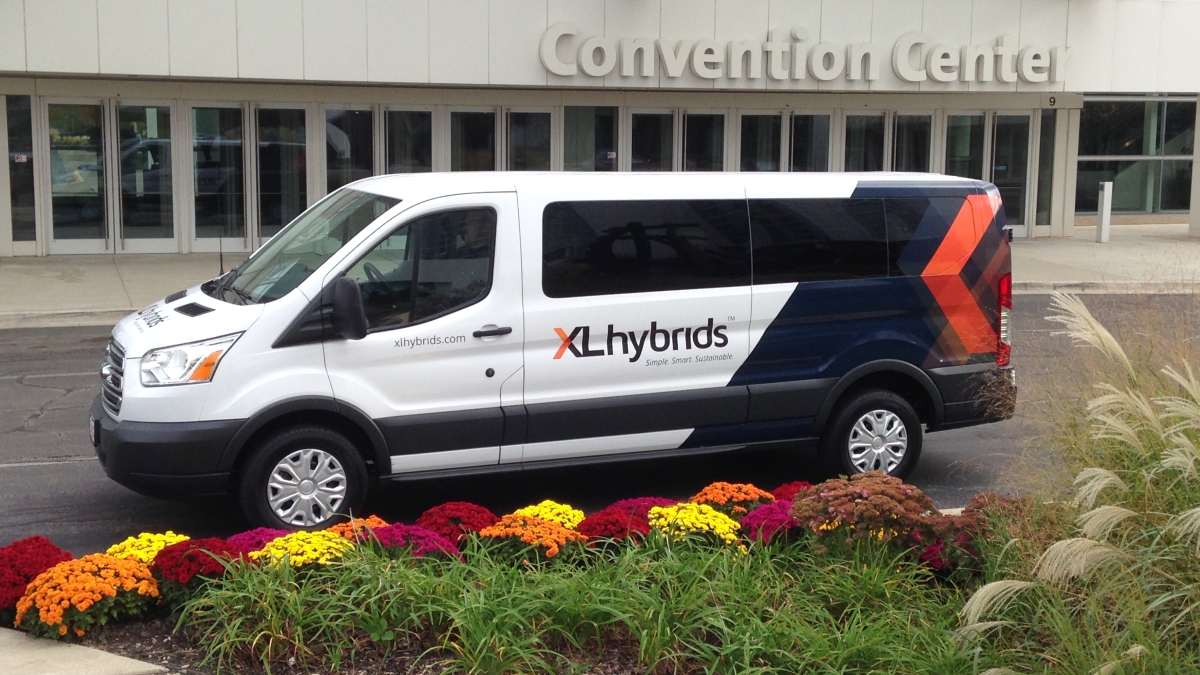The saying about solar power is that it pays for itself, but not in your lifetime: The same thing could be said about hybrid vehicles. Yes, they run cheaper and they’re better for the environment, but the initial investment can be daunting.
If that’s true for individual consumers, consider the plight of fleet managers who oversee hundreds or thousands of vehicles.
But a company nurtured by Arizona State University has hit upon a solution, offering systems to convert new or existing fleets to hybrid vehicles.
It’s a technology that has been snapped up by Coca-Cola, the city of Boston, the Seattle Fire Department, ThyssenKrupp Elevator Americas and AmeriPride Services.
XL Hybrids sells electric drive systems that use regenerative braking to cut back on fuel use. An electric motor helps slow the vehicle during braking, which charges the hybrid battery. When the driver accelerates, the hybrid battery releases the stored energy to the electric motor, helping to propel the vehicle.
To date, XL Hybrids converted vehicles have driven more than 42 million customer miles. That’s more than 87 round-trip journeys to the moon. XL converted hybrids have saved almost 788,000 gallons of fuel. That’s 49,250 fillups for an average SUV. They have kept more than 7,000 tons of carbon dioxide out of the air, and saved 6,300 hours of driver productivity by being on the road longer and not returning for gas topoffs. That’s more than 157 work weeks, or roughly a year’s work of three employees.
Companies attracted to the technology tend to have put 30,000 to 40,000 miles per year on vehicles they keep for about a decade. Add that up, and it’s the equivalent of about 14 trips from Los Angeles to New York. They can cut fuel bills for urban driving by 20 percent and CO2 emissions by the same percentage.
“It can definitely turn into a very meaningful number when they have tens of thousands of vehicles in the fleet,” said XL Hybrids chief executive officer and founder Tod Hynes.
The XL3 Hybrid Electric Drive System installs in a day, underneath the vehicle body.
“The hybrid system is easy to deploy and easy to rollout,” Hynes said. “We tried to fit into the existing infrastructures.”
Coca-Cola converted 280 service vans with the XL3 Hybrid system. After 9 million service miles, the converted fleet showed 20 percent less fuel use than conventional vans. The move also contributed to the company’s goal of reducing its carbon footprint by 20 percent by 2020. The hybrid vans are expected to eliminate about 6,000 total metric tons of carbon dioxide emissions that conventional fuels would produce over their 10-year life span.
Read more: View a PDF of the Coca-Cola case study.
“This technology offered an option that provided low maintenance and fuel savings,” said Tony Eiermann, Coca-Cola North America fleet assets manager. “It was also able to work with our existing fleet structure.”
Coca-Cola continues to place orders with XL Hybrids.
“We are scaling up,” Hynes said. “Most of our sales are repeat orders.”
A new plug-in product that converts Ford F-150s — the most popular truck in the country — is getting a lot of interest from utility companies that use them.
Hynes has a background in renewable-energy sources. As the industry took off, in 2008 he wanted to catch the next big thing to compete with oil.
“The thinking behind XL Hybrids was, ‘How can we start a company that is a good competitor with oil?’” he said.
Cody Friesen, an associate professor in the School for Engineering of Matter, Transport and EnergyThe School for Engineering of Matter, Transport and Energy is part of the Ira A. Fulton Schools of Engineering., reached out to Hynes and said the Avnet Innovation Lab could be helpful. Friesen is a veteran of two startup companies and founded the Avnet Innovation Lab.
ASU has inspired or assisted in the formation or growth of an estimated 1,000 startups. More than 500 people are now employed at ASU-linked startups. ASU inventions have attracted hundreds of millions of dollars in external funding, including $96 million in fiscal year 2016.
The Avnet Innovation Lab, in partnership with the Fulton Schools of Engineering, is designed to spur economic growth in the technology sector and enable aspiring entrepreneurs to advance their innovations.
“It really was a helpful connection for us, because we have a pretty extensive supply chain,” Hynes said.
As a startup, it’s hard to negotiate good deals. Starting a year ago, Avnet helped XL Hybrid review contracts and helped bid on some new agreements. The company continues to work with Avnet to get costs down.
“We’re open to talk if ASU wants us to make some shuttle buses more efficient,” Hynes said.
More Science and technology

Brilliant move: Mathematician’s latest gambit is new chess AI
Benjamin Franklin wrote a book about chess. Napoleon spent his post-Waterloo years in exile playing the game on St. Helena. John Wayne carried a set and played during downtime while filming “El…

ASU team studying radiation-resistant stem cells that could protect astronauts in space
It’s 2038.A group of NASA astronauts headed for Mars on a six-month scientific mission carry with them personalized stem cell banks. The stem cells can be injected to help ward off the effects of…
Largest genetic chimpanzee study unveils how they’ve adapted to multiple habitats and disease
Chimpanzees are humans' closest living relatives, sharing about 98% of our DNA. Because of this, scientists can learn more about human evolution by studying how chimpanzees adapt to different…
